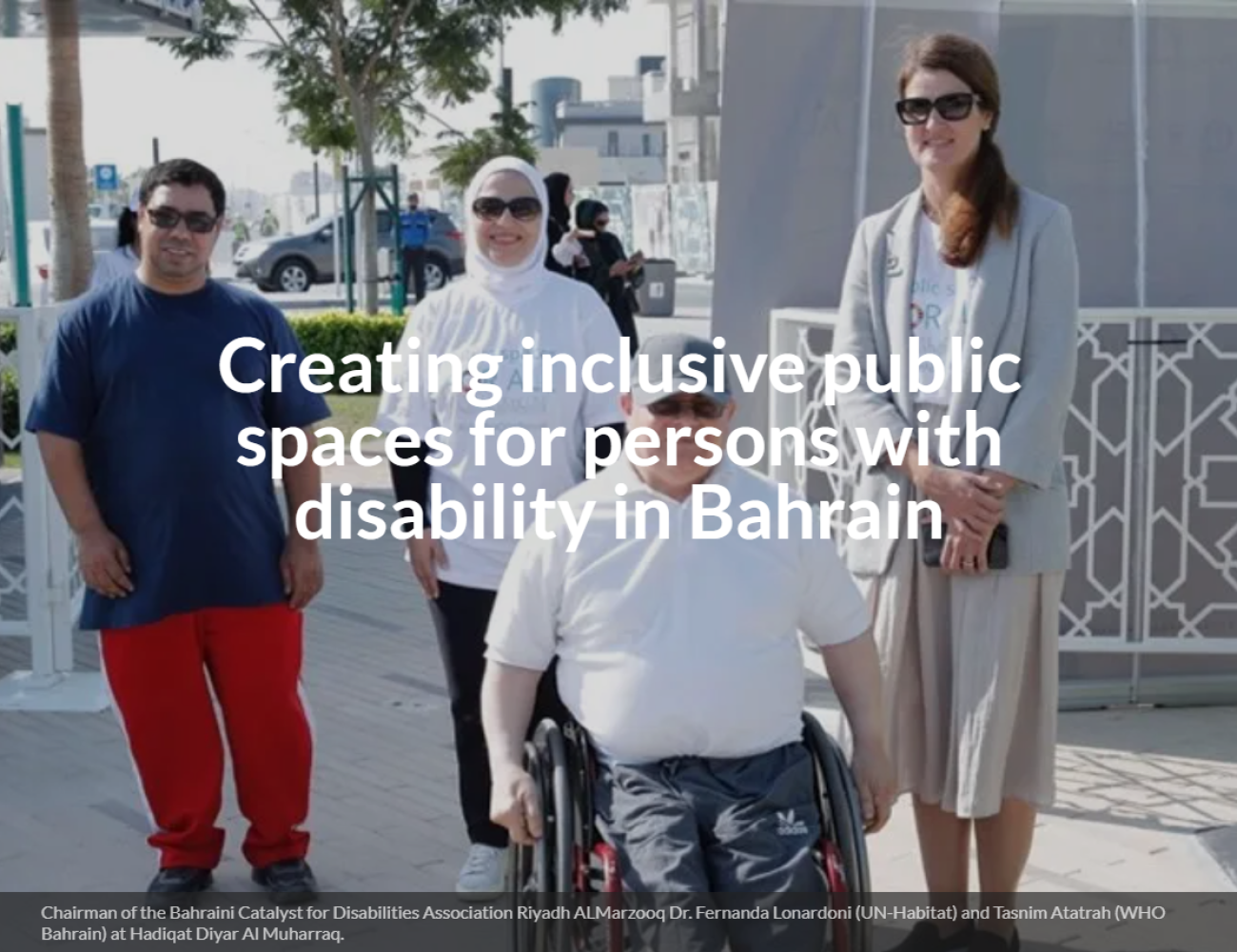Creating inclusive public spaces for persons with disability in Bahrain

On International Day for Persons with Disability, UN-Habitat and the World Health Organization partnered to raise awareness of the
As Chairman of the Bahraini Catalyst for Disabilities Association, Riyadh ALMarzooq has advocated for the rights of people living with disability in his country for almost 40 years.
Although in comparison to other developing nations, Bahrain has managed a clean sheet in the welfare of those with a disability, some obstacles still remain. Here we can speak of issues like cultural biases against people with disability and their access to public spaces, transport, and urban landscape.
“We are fortunate that the laws in Bahrain protect persons with disabilities and provide adequate care; an area of improvement lies in applying the preexisting laws into action. For the needs of those with disabilities to be met in Bahrain, it would require a collaborative effort between persons with disabilities, various stakeholders, the larger community, the government, and the private sector.
The solution lies in the efforts of everyone in a society coming together, for an initiative cannot come to fruition without the aid of everyone in the community; solutions need collective action,” he said.
On International Day for Persons with Disabilities, In commemorating this year’s International Day for Persons with Disability, UN-Habitat and the World Health Organization partnered to raise awareness of the importance of inclusive and accessible public spaces for all.
With funding contribution from the UN in Bahrain and in collaboration with government entities and other stakeholders, an event was organized in a public park in Manama to emphasize the vital role of mainstreaming inclusive and accessible public spaces within the foundations of urban societies.
The event was held in partnership with the World Health Organization in Bahrain (WHO Bahrain) and with funding from the U.N. Bahrain in collaboration with government entities and stakeholders. It was aimed to bring awareness, emphasising the vital role of mainstreaming inclusive and accessible public spaces within the foundations of urban societies.
Further, the celebration aimed to raise awareness and bring together government, private sector, and community members at an accessible public park to leave no one behind and raise awareness of inclusive and accessible public spaces for all. The celebration also addressed was addressing how transformative solutions and inclusive development start in public spaces to ensure no one is left behind.
“When designing a public park, urban planners and architects are asked to consider the accessibility of the facilities from start to finish, such as accessible parking, exercise equipment, washrooms, and an accessible-friendly playground for kids. This a reminder that all have a role to play in building a more inclusive, accessible, and equitable society”, said Fernanda Lonardoni, Head of UN-Habitat Bahrain.
"Inclusive public spaces and parks have two complementary components: accessibility regarding physical infrastructure and inclusion on all community and users. Contributing to the global movement for public spaces, making them available for all people, of all ages, abilities, and circumstances, to be built within the foundations of our urban societies”, she added.
These simple design changes significantly impact communities and facilitate easier access for persons with disabilities to interact freely with public spaces. Societies which promote 'cities for all' where no one is left behind are people-centred and thus far more sustainable in design.
The annual observance of the International Day of Persons with Disabilities (IDPD) on 3 December was proclaimed in 1992 by the United Nations General Assembly resolution 47/3. The observance of the Day aims to promote an understanding of disability issues and mobilize support for the dignity, rights and well-being of persons with disabilities.
“On the International Day of People with Disabilities, we are recognizing the importance of taking a holistic approach to ensuring health and well-being opportunities to benefit all. By ensuring health in all policies, we are promoting an inclusive approach to realizing indivisible Sustainable Development Goals, guided by Good Health and Well-being, by addressing all relevant and related global targets. We would like to thank our governmental, national and One UN counterparts for ensuring that together, we leave no one behind. And we share words of appreciation and congratulations with the people of Bahrain, for their role in embodying an example of an inclusive community to benefit Health For All, By All, ” said Tasnim Atatrah, WHO Representative in Bahrain.
When designing a public park, urban planners and architects are asked to consider the accessibility of the facilities from start to finish, such as accessible parking, exercise equipment, washrooms, and an accessible-friendly playground for kids. This is a reminder that all have a role in building a more inclusive, accessible, and equitable society.
"Inclusive public spaces and parks have two complementary components: accessibility regarding physical infrastructure and inclusion on all community and users. Contributing to the global movement for public spaces, making them available for all people, of all ages, abilities, and circumstances, to be built within the foundations of our urban societies”, noted Fernanda Lonardoni, Head of UN-Habitat Bahrain.
The goal of this collaborative event was to bridge communities across Bahrain, shedding light on the importance of diversity and inclusion and advocating for policymakers and private sectors to convert existing public spaces into highly accessible and inclusive urban landscapes.
These simple design changes significantly impact communities and facilitate easier access for persons with disabilities to interact freely with public spaces. Societies which promote 'cities for all' where no one is left behind are people-centred and thus far more sustainable in design. The annual observance of the International Day of Persons with Disabilities (IDPD) on 3 December was proclaimed in 1992 by the United Nations General Assembly resolution 47/3. The observance of the Day aims to promote an understanding of disability issues and mobilize support for the dignity, rights and well-being of persons with disabilities.



